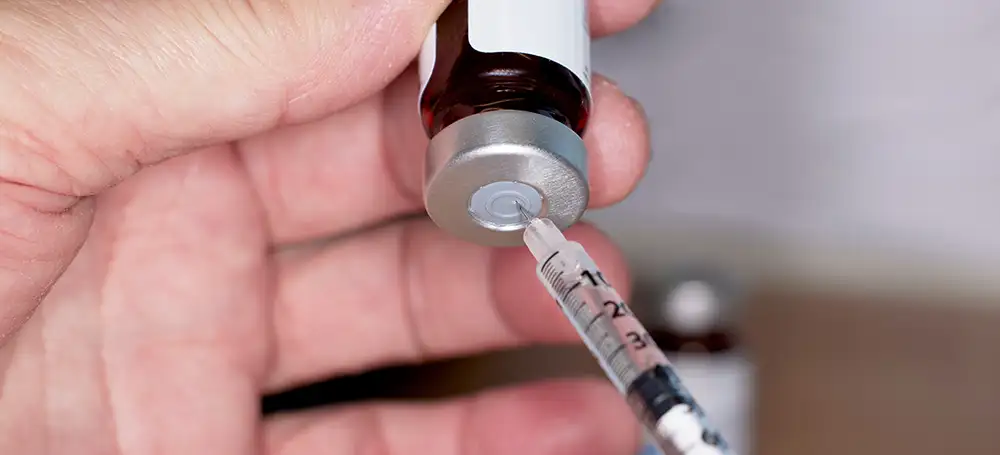Some topics are just tough to talk about. Take your sexual health, for example. Years of listening to other men’s locker room boasting can make it especially hard to bring up any issues you might be having in the bedroom or any worries you have about how things are going in your relationship. We get it. You don’t want to feel embarrassed, and you certainly don’t want to make yourself feel vulnerable talking about sensitive issues.
Here’s the trouble with that, though. If you don’t talk about an issue, you can’t fix it. You can’t get the help you need.
That’s why it’s important to take your concerns about your sexual health to a doctor — and to the right doctor (we’ll talk more about that in a minute). When you come to a men’s health clinic, you’re putting yourself in the hands of medical professionals who know what they’re talking about… and more importantly, they know what you’re talking about.
Suddenly the tough conversations become not just simple but helpful. You start getting the answers you’ve been longing to hear. You find solutions to problems you might have thought were unsolvable.
Let’s walk through the process of taking these most sensitive issues to a place where you can find help and understanding.
You’re Not the First One to Have This Discussion
Start your inner preparation for the tough discussion by realizing that your doctors have likely heard everything you have to say many times over. Even if you feel uncomfortable talking about sensitive issues such as, say, erectile dysfunction, that topic is everyday news for your doctor. Because, yes, there really are that many men dealing with the same thing. Just knowing you’re not the first (or only) man to have this conversation with his doctor can make a big difference.
Write It All Down (and Figure Out How to Say It)
When you’re getting ready to have any tough conversation, sometimes it can help to do a little prep ahead of time. Try writing down all your concerns. Having a list in hand can make sure you don’t forget an important question or symptom, and it streamlines your appointment, which can make a big difference. That list also gives you something to hang on to and refer to if you start to feel uncomfortable with the topic of discussion during your appointment.
As you make your list, think about each and every symptom you’ve been dealing with, even if some of them seem totally unrelated to your primary concern. Your body is a complex and amazing organism, and you’d be surprised at how many symptoms might actually be related. Pay particular attention to the following symptoms:
- Difficulty achieving erections
- Difficulty maintaining erections
- Loss of libido or sex drive
- Any other issues surrounding your sex life and sexual health
- Brain fog
- Lack of mental focus
- Difficulties with memory
- Fatigue or exhaustion
- Depression or lack of interest in everyday life
- Decreased muscle mass
- Physical weakness
- Irritability
- Weight gain, especially if it involves belly fat
- Low energy levels
- Insomnia or poor sleep
Thinking about how you’ll broach a sensitive subject can also make sure you use your time to discuss what really matters rather than leaving it for the last second and wasting time talking about trivialities. If you want to talk about erectile dysfunction, for instance, you might start off by saying, “My partner and I are having some issues in the bedroom,” or “How would I know if I’m dealing with some erectile dysfunction?” Planning what you want to say can make it easier to get the conversation started, and it increases your chances of getting all the answers you’re hoping for.
Choose the Right Doctor
Let’s be honest. Some doctors aren’t really as prepared to discuss issues of sexual health as you might hope. It makes sense why you might feel uncomfortable talking about issues surrounding testosterone with the same family medicine doctor who measures your kids’ height every year. That’s why men’s health clinics, such as Boston Vitality, exist. When you see a urologist — a specialist in men’s health — you know you’re getting the most up-to-the-minute advice and treatment from someone who has vast experience and expertise in the issues you care most about.
Know What to Expect
Much of your appointment at a men’s health clinic in Boston will feel familiar. We’ll take your medical history and ask about your family’s medical history. We’ll inquire about your medications and your exercise and eating habits. Have you had any surgeries or chronic illnesses? Do you smoke, drink or use any illegal drugs? What kind of stress have you been under lately?
We’ll want to hear about your symptoms — especially any symptoms directly related to your sexual health. We might ask if you’ve experienced any loss of affection for your partner or an overall loss of libido. And you can expect a physical exam. Through all of this, you should feel free to talk openly about even the most minuscule or intimate of symptoms or concerns. Remember, we’ve heard it all, and we’re the people who actually have answers to your questions.
Depending on what you discuss and what symptoms you’re concerned about, your doctor is likely to order some tests. Expect to have some blood drawn to measure your hormone levels, including your testosterone levels. Your doctor will explain why they want specific tests and what they expect to learn from them.
Ask All the Questions
We know you have questions. Make sure you list them on that document filled with your concerns. At Boston Vitality, we go to great lengths to make sure we answer all your questions.
What About Tests?
Most of the tests we’re likely to run to determine your overall health and well-being are simple blood tests. If you want to be tested for specific conditions, make sure you let us know so we can draw blood appropriately. If we’re checking your testosterone levels (and there’s a very good chance we’ll want to have that information so we can answer your questions thoroughly), we’ll ask to draw your blood as early in the morning as possible. That’s because testosterone levels are highest in the morning (and yes, that’s why men get morning erections). In some cases, we may ask for second rounds of blood tests to truly confirm what’s going on in your body.
What About Treatment?
The appropriate treatment for your situation depends on the diagnosis you receive. You may be surprised to learn that one diagnosis explains many of the seemingly disconnected symptoms you’ve been experiencing. For example, if your test results reveal that your testosterone levels are clinically low (that is, below the normal range of 300 to 1,000 nanograms of testosterone per deciliter of blood), you may have a full explanation for the weight gain, low libido, brain fog and insomnia you’ve been dealing with — all of which you probably assumed had nothing to do with each other.
Whatever your situation, we’ll talk to you about the appropriate treatment. Maybe you’ll want to learn more about HGH peptides and how they can rev up your energy levels and improve your overall health, essentially turning back the clock on aging. If you’re concerned about weight gain, we can explain the new hormone-based treatments available — semaglutide and tirzepatide — so you can see if those are right for you. And, of course, we’re ready to talk to you about testosterone replacement therapy as well.
What About Testosterone Replacement Therapy?
And if testosterone replacement therapy is the right answer for what ails you, we’ll talk with you about all its benefits and risks. We’ll explain all your treatment options. You might opt for testosterone injections, testosterone pellets placed under your skin, testosterone patches or testosterone gels, all depending on your lifestyle, your living situation and your preferences.
Even if testosterone replacement therapy would be an appropriate treatment for your condition, it’s possible that you’re not a good candidate for it. If you have a medical history of prostate cancer, breast cancer or some other medical conditions, we may have to steer you away from testosterone treatment. That’s because your overall health and well-being is our highest concern. We’ll talk through all your concerns and make sure you’re a viable candidate for treatment before proceeding.
Having the Tough Conversations at Home
Your doctor’s office isn’t the only place where you might face a tough conversation. Your sexual health is also of great importance to your partner — and that can mean having some uncomfortable discussions at home as well. You may be surprised, though, to realize just how much easier those conversations are once you have some actual facts to discuss. Learning what’s going on with your body and being able to discuss real test results with your partner can open up the possibilities for change and improvement. We can also help you understand just how to broach difficult subjects at home.
What to Expect Going Forward
As a man in Boston with concerns about your sexual health, you deserve honest, experienced and reliable treatment. That’s what we provide at Boston Vitality. When you come to us with questions, you can expect to receive answers and solutions. That may require two or even a few more visits. We’ll start off by taking those blood tests, and then we’ll want to see you again to discuss the results. Based on those results, we’ll be able to offer a diagnosis and suggest the appropriate treatment so you can regain your sexual health.
Depending on the treatment, we may send you off to administer your own treatment (as you would do if, say, you opted for testosterone patches to treat testosterone deficiency), or we may see you more often (for instance, for placement of testosterone pellets or even administration of testosterone injections). We’ll certainly want to keep an eye on your blood work and especially your various hormone levels so we can make any needed adjustments to your dosages or treatment. We’ll also monitor your overall health to make sure you’re optimizing your hormones in every way, whether you want to fight aging, restore sexual vitality, lose weight or boost your energy levels.
Not all doctors have the expertise or training to handle men’s health issues in the best possible manner. That’s why we’re here. You should be able to talk to your doctor about any health-related concern you have, including regarding your sexual health. You shouldn’t have to resort to a medical spa that’s more concerned with selling Botox than with your well-being.
Come to us at Boston Vitality when you want to participate in a forthright, practical discussion of your sexual health. We promise honesty and experience that will lead to you getting the medical care you need. Contact us today to make an appointment.












